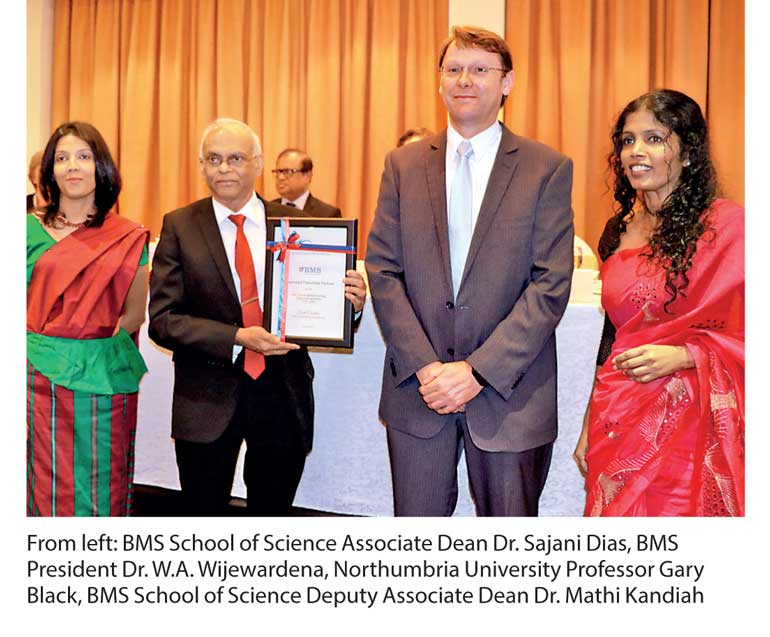Friday Feb 27, 2026
Friday Feb 27, 2026
Wednesday, 27 September 2017 00:00 - - {{hitsCtrl.values.hits}}
 As Sri Lanka looks toward emerging sciences, Northumbria University, Newcastle has become the island’s first UK University to launch a biotechnology degree.
As Sri Lanka looks toward emerging sciences, Northumbria University, Newcastle has become the island’s first UK University to launch a biotechnology degree.
Sri Lanka’s Minister of Science, Technology and Research Susil Premajayantha spoke at the recent launch of Northumbria’s BSc Honours Degree in Biotechnology at the Business Management School (BMS) in Colombo.
Minister Premajayantha emphasised the need for Sri Lanka to plan their educational goals in terms of future developments in applied sciences, and named Northumbria University’s biotechnology degree as a key part of that growth.
The partnership between Northumbria University and BMS has developed over many years with BMS being one of Northumbria’s strategic partners. The school developed a strong partnership with Northumbria University’s Faculty of Health and Life Sciences after the launch of its BSc Honours Degree in Biomedical Science in 2013.
St. John Usher, Head of Applied Sciences at Northumbria University, said: “Northumbria’s Faculty of Health and Life Sciences has enjoyed a hugely successful working relationship with BMS in Sri Lanka over the years and we’re delighted to be able to announce this latest program in what is a very exciting and emerging science in Sri Lanka.
“The biotechnology sector of India is currently on a strong growth trajectory and Sri Lanka has recognised the importance of this industry in the growth of its own economy.
“This is the first year that BMS, in collaboration with Northumbria, has recruited students to the biotechnology programme and it’s great to see that some of the teaching on this degree is being provided by our former Masters students.”
In 2015 approval was given to franchise the final year of the BSc (Hons) Biomedical Science programme to BMS. This has involved extensive development of state of the art laboratories at BMS so that students are assured of a high quality learning experience.
This development provides students from Sri Lanka with the opportunity to study in their home country, with a considerable reduction in cost when compared to studying abroad.
Meanwhile, the relationship between Newcastle Business School, at Northumbria, and BMS is entering its 12th year and has produced more than 1,000 graduate students.
Dr. Wijewardena, President of the Business Management School (BMS), was awarded an Honorary Doctorate of Civil Law by Northumbria University in 2016.
His career at the Central Bank of Sri Lanka lasted 37 years culminating in nine years as the Deputy Governor, responsible for economic research, monetary policy, financial system stability, public debt, rural credit and banking.
Simultaneously, he was the Chairman of both the Institute of Bankers of Sri Lanka and the Sri Lanka Accounting and Auditing Standards Monitoring Board.
Northumbria University, Newcastle is a research-rich, business-focused, professional university with a global reputation for academic excellence. It is one of the largest universities in the UK with almost 34,000 students from 131 countries.
Northumbria is ranked top 50 in the UK for research power and had the fourth largest increase in quality research funding (REF 2014). According to Times Higher Education, Northumbria had the biggest rise in research power of any university in the UK.
Working collaboratively with many external organisations including the NHS, government agencies and funding bodies, Health and Life Sciences has a reputation for delivering high-quality teaching, learning and research, which transforms lives. There is significant interest from international governments in the university’s ability to transform and contribute to developing health economies, placing Northumbria at the forefront of shaping global life science, health, education and social care agendas.
Partnerships are the lifeblood of the Faculty on a regional, national and international scale. Staff are actively involved in major reconstruction and master planning of projects in the Middle East, China and Africa. The Faculty has extensive partnerships in Hong Kong, Sri Lanka, Singapore and Grenada.
The Faculty’s partnerships extend to public, private and cultural sector organisations including NHS England, many of the region’s Foundation Trusts, the International Centre for Life and Premier League football teams. Contract research is undertaken for world-leading organisations including GlaxoSmithKline; Nova International and Berghaus, with CPD offered to organisations including Procter & Gamble, Akzo Nobel and bioMérieux.